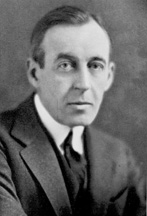David A. Reed
David A. Reed | |
|---|---|
 | |
| United States Senator from Pennsylvania | |
| In office August 8, 1922 – January 3, 1935 | |
| Preceded by | William E. Crow |
| Succeeded by | Joseph F. Guffey |
| Personal details | |
| Born | David Aiken Reed December 21, 1880 Pittsburgh, Pennsylvania |
| Died | February 10, 1953 (aged 72) Sarasota, Florida |
| Political party | Republican |
| Spouse | Adele Reed |
| Alma mater | Princeton University (A.B.) University of Pittsburgh (LL.B.) |
David Aiken Reed (December 21, 1880 – February 10, 1953) was an American lawyer and Republican party politician from Pittsburgh, Pennsylvania. He represented Pennsylvania in the United States Senate.
Biography
David Aiken Reed was born on December 21, 1880, in Pittsburgh, Pennsylvania. He was a descendant of David Reed.[1] He graduated from Shady Side Academy, a Pittsburgh prep school, in 1896. He then obtained his college education at Princeton University, from which he graduated with a Bachelor of Arts degree in 1900. He earned a Bachelor of Laws from the University of Pittsburgh Law School in 1903 and was admitted to the bar during the same year.[2] He practiced law from 1903 to 1917 in Pittsburgh, also serving as chairman of the Pennsylvania Industrial Accidents Commission, until serving as a major in field artillery in World War I until 1919, after which he resumed practicing law.
Reed, a Republican, was appointed to the United States Senate on August 8, 1922, to fill a vacancy created by the death of William E. Crow. He was subsequently elected on November 7, 1922, to serve for the remainder of Crow's term and a six-year term in his own right, beginning in March 1923. Along with Congressman Albert Johnson, Senator Reed was a co-author of the Immigration Act of 1924, the purpose of which was to restrict the movement of Eastern and Southern Europeans into the United States, and prohibit Asian immigration in its entirety. Reed served as chairman of the Committee on Expenditures in Executive Departments and Committee on Military Affairs. He was reelected in 1928, but was unsuccessful in seeking reelection in 1934. His tenure in the U.S. Senate ended with the expiration of his term on January 3, 1935.
After serving in the U.S. Senate, Reed resumed practicing law in Pittsburgh until his death on February 10, 1953, in Sarasota, Florida. He was interred in Arlington National Cemetery in Arlington, Virginia.
References
- ^ "The Speer-Aiken Family" (PDF). August 13, 1979. Retrieved January 7, 2014.
- ^ Pittsburg Leader (1913). The Book of Prominent Pennsylvanians: A Standard Reference. Leader Publishing. p. 76.
External links
- United States Congress. "David A. Reed (id: R000114)". Biographical Directory of the United States Congress.
- David Aiken Reed Scrapbooks at Seeley G. Mudd Library, Princeton University
- David A. Reed at Find a Grave
![]() This article incorporates public domain material from the Biographical Directory of the United States Congress
This article incorporates public domain material from the Biographical Directory of the United States Congress
- 1880 births
- 1953 deaths
- United States Senators from Pennsylvania
- Politicians from Pittsburgh
- University of Pittsburgh School of Law alumni
- Appointed United States Senators
- Pennsylvania Republicans
- Republican Party United States Senators
- Princeton University alumni, 1900–09
- Shady Side Academy alumni
- 20th-century American politicians

